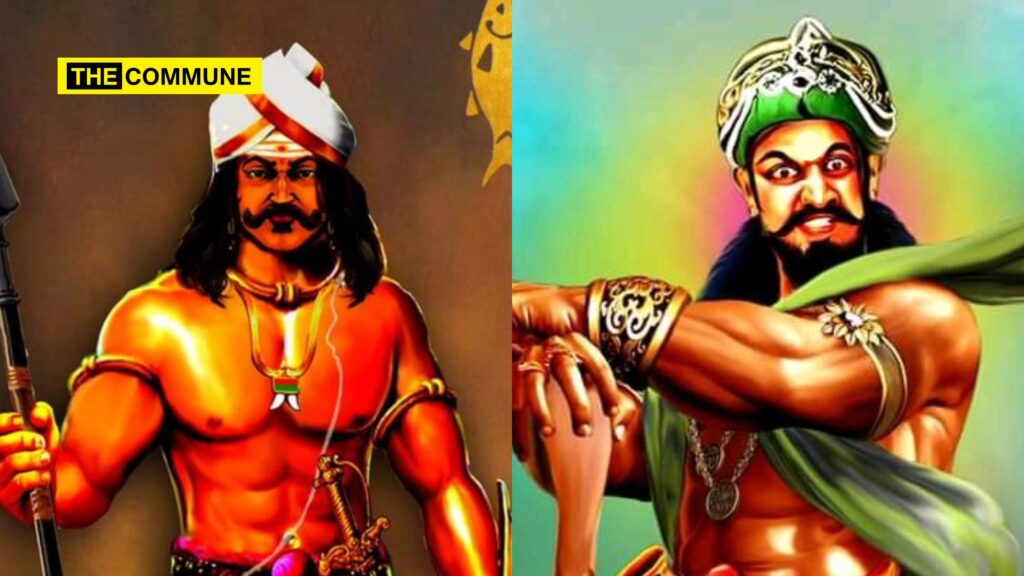Many members of the Devendra Kula Vellalar clan served as soldiers during the period of the Palayakkars. The camp chiefs formed and managed regiments in their camp areas to protect their camps from the surrounding jungles and the increasing dominance of foreigners. Pulithevan (1715-1767), a Palayakar who ruled from Nerkaattan Chevalai (Nerkattumseval today) as his headquarters, maintained one such army.
Kaalaadi, a sub-division of the Devendra Kula Vellalar clan, has served in those regiments for generations and was given the name “Kaalaadi” because they were serving in the infantry. In Tamil, infantry is known as Kaalaatpadai – காலாட்படை.
The soldiers in the army who rendered extraordinary service were described as Periya Kaalaadi, Chinna Kaalaadi, Karaiyaalar Kudumbanar, Saattan Kaalaadi, Shankarakudaiyan, Maatukkudumpanar, Muthukutumpanar, Kattakkaruppanan. They also functioned in groups as units of larger soldiers.
It appears that the clan’s leader wanted that group to be associated with them because of the valour, fighting spirit, initiative, and honesty of their community and their leaders. One such veteran is the Periya Kaaladi popularly known as Venni Kaaladi who belonged to the sub-division of Devendra Kula Kaladi and served as the main commander of Puli Thevar’s Army.
Muhammad Yusuf Khan Alias Marudhanayagam
Maruthanayagam (1725 – 1764), born in a village called Panaiyur in British India, what is now in Nainarkoil Taluk, Ramanathapuram District of Tamil Nadu, was the commandant of the British East India Company’s Madras Army.
After converting to Islam, he took the name, Muhammad Yusuf Khan. When he became the ruler of Madurai, he was dubbed as Khan Sahib. He rose through the ranks of the Arcot troops to become a commandant of the British East India Company troops.
He was hired by the British and the Arcot Nawab to put down the Polygar (a.k.a. Palayakkarar) uprising in South India. When the Madurai Nayak rule ended, he was entrusted with the administration of the Madurai region.
Puli Thevar Vs British:
Pulithevar’s reign marked the end of the Pandya dynasty and the decline of the Nayak dynasty. It was a time of transition, with Arcot Nawabs encroaching on Tamil regions and the British entering into Indian politics.
The Palayakkar Puli Thevar recognized that the small Palayams were vulnerable to such large-scale regime changes, so he gathered all the villagers and made the them realise the importance of unity.
All Palayakkars avoided paying tax to the chieftains as per the Puli Thevar instructions. The Tamil region fell into the hands of the Islamic ruler Arcot Nawab as the power of Nayakkars weakened. It later passed into the hands of Maharashtrian kings, and then into the hands of the Islamic rulers. However, due to a feud between the Nawab of Arcot and another Muhammadan king, both factions tended to collect tribute separately from the Palayakkars in Tamil Nadu. Taking advantage of the discord between these two factions, the Palayakkars ceased paying taxes entirely.
The Nawab of Arcot sought the assistance of the British in this situation. According to their agreement, the Nawab of Arcot gave the British the authority to collect taxes. Since then, the British have engaged in direct conflict with the Indian kings. British army led by Colonel Alexander Heran, the Nawab’s forces led by Mabus Khan, the brother of the Nawab of Arcot, and the native sepoys led by Muhammad Yusuf Khan set out to attack the Palayakkars in 1755 as they refused to pay taxes.
Yusuf Khan, unable to defeat the army of Puli Thevar led by Periya Kaaladi, decided to attack them at night. Yusuf Khan’s troops decided to surround and fight the Nerkattumseval fort at night from the camp they had set up. Periya Kaaladi encamped on the forest road after receiving intelligence about Yusuf Khan’s secret attack and resisted the enemy. During the attack, he was wounded due to the attack by one of the enemy soldiers.
Despite the stomach being torn and the intestines coming out, he pushed it back in, took the cloth tied as a turban, and tied it along the gut before continuing to fight the war and defeating the opponents. Realizing that many more people were lurking in the forest areas and might attack in the next few days, he got on his horse and reported to Puli Thevan. He rode his horse to Puli Thevar and reported that the enemy had gone into hiding with the army in the forest and collapsed on Puli Thevar’s lap.
Devastated by his friend’s death, Puli Thevan erected a stone near the battlefield and named it “Kaaladi Medu.”
Napoleon’s forces were fighting to take the German city of Ratisbon in 1809. Napoleon stood on a nearby hill, looking down at Ratisbon. A small cloud of dust suddenly moved away from Ratisbon. Napoleon noticed a fleet approaching him. It was a young man on a horse who told Napoleon about the victory of the French forces at Ratisbon and that he hoisted the French flag himself. When Napoleon saw the wound in his chest, he said, “You are wounded,” and the brave young man fell down, saying, “No, I am killed.” This is the essence of Robert Browning’s poem ‘The Incident of the French Camp’.
While our history textbooks may have forgotten Vennikaladi, the man who died on Puli Thevar’s lap continues to live in the Tamil folklore similar to the poem ‘The Incident of the French Camp,’ which described the valor of a French soldier.
Click here to subscribe to The Commune on Telegram and get the best stories of the day delivered to you personally.

